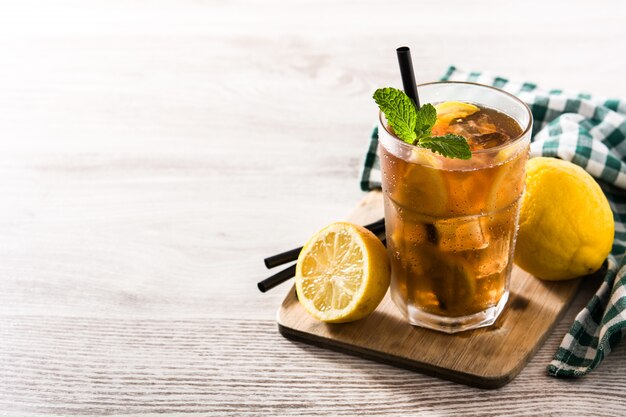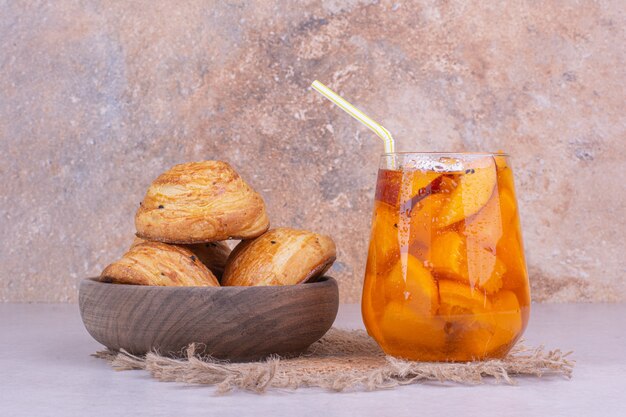Sweet tea is a beloved beverage, particularly in the Southern United States. Known for its refreshing sweetness and iced presentation, it’s a staple on many tables. But does sweet tea have caffeine? The short answer is yes. Most sweet tea is made with black tea, which naturally contains caffeine.
This article delves into sweet tea, its caffeine content, and the available options for those who prefer less or no caffeine. Let’s explore everything you need to know about this classic drink.
What is Sweet Tea?
Sweet tea is more than just a drink; it’s a cultural phenomenon. It’s a type of iced tea traditionally brewed with black tea and sweetened generously with sugar. The resulting beverage is served cold, making it a perfect choice for hot summer days.
The History of Sweet Tea
Sweet tea originated in the Southern United States. Its roots can be traced back to the early 19th century, when tea was a popular import, and sugar was widely used as a sweetener. By the 20th century, sweet tea had become synonymous with Southern hospitality.
Variations of Sweet Tea
While black tea is the most common base, sweet tea isn’t limited to this variety. Some people use green tea for a lighter flavor or herbal teas for a caffeine-free option. Flavored syrups, lemon, or mint are often added to elevate its taste, making it even more versatile.
Does Sweet Tea Contain Caffeine?
Yes, sweet tea typically contains caffeine. The caffeine comes from the tea leaves used as its base. However, the amount of caffeine can vary depending on several factors. Let’s take a closer look.
Caffeine in Black Tea
Black tea, the primary ingredient in most sweet tea recipes, naturally contains caffeine. On average, one cup of black tea contains about 40–70 milligrams of caffeine per 8-ounce serving. This is significantly less than coffee but enough to provide a mild energy boost.
Factors Influencing Caffeine Levels
The caffeine content in sweet tea can vary based on a few key factors:
- Type of Tea: Black tea has the highest caffeine levels, followed by green tea. Herbal teas are generally caffeine-free.
- Steeping Time: Longer steeping increases caffeine content as more of it is extracted from the tea leaves.
- Brewing Method: The temperature of the water and the concentration of tea leaves also affect caffeine levels.
How Much Caffeine is in Sweet Tea?
The exact amount of caffeine in sweet tea depends on the brand and brewing method. To help you understand, here’s a breakdown of the caffeine content in popular sweet tea brands.

Caffeine Levels in Common Brands
- Lipton Sweet Tea: Around 24 mg per 8-ounce serving.
- Snapple Sweet Tea: Approximately 37 mg per 8-ounce serving.
- Homemade Sweet Tea: Can range from 20–60 mg per 8-ounce serving, depending on the recipe.
Comparison to Other Beverages
To put things in perspective:
- A standard 8-ounce cup of coffee contains 95–200 mg of caffeine.
- A can of cola has around 35 mg.
- Energy drinks often have 80–100 mg per serving.
Sweet tea falls in the middle range, offering a milder caffeine boost compared to coffee or energy drinks.
Decaf Sweet Tea Options
If you’re trying to reduce your caffeine intake, don’t worry! There are several ways to enjoy sweet tea without the buzz.
Decaffeination Processes
Decaf teas undergo a process to remove most of their caffeine content. There are three main methods:
- Chemical Solvents: Common but leaves trace amounts of caffeine.
- CO2 Extraction: Uses carbon dioxide to strip caffeine naturally.
- Water Processing: A chemical-free method, ideal for organic tea lovers.
Decaf sweet tea retains the flavor of regular sweet tea with minimal caffeine, typically less than 5 mg per cup.
Home Brewing Techniques to Reduce Caffeine
You can also brew your own sweet tea with less caffeine by trying these tips:
- Use decaffeinated tea leaves for brewing.
- Shorten the steeping time to minimize caffeine extraction.
- Opt for herbal teas like rooibos or chamomile, which are naturally caffeine-free.
Health Implications
Sweet tea’s caffeine content has both benefits and drawbacks. Understanding these can help you enjoy your drink responsibly. Let’s look at how caffeine impacts your health and how much is safe to consume.
Positive Effects of Caffeine
Caffeine in sweet tea can boost your alertness and energy levels. It helps you stay focused and combats fatigue. For some, it even improves mood and enhances physical performance. These effects make sweet tea a great pick-me-up.
Potential Drawbacks of Caffeine
Excess caffeine can lead to insomnia, anxiety, and dehydration. For some, it may also trigger heart palpitations or an upset stomach. If consumed in large amounts, it might even cause dependency or withdrawal symptoms like headaches.
Recommendations for Daily Caffeine Intake
Experts suggest that healthy adults consume no more than 400 mg of caffeine daily. This is roughly equivalent to four cups of coffee or six to eight cups of sweet tea. Pregnant women and those with health conditions should aim for less.
Sweet Tea Alternatives for Low Caffeine or Sugar
Not a fan of caffeine or sugar but love sweet tea? There are plenty of alternatives to fit your dietary preferences while still enjoying a refreshing drink.
Herbal Tea and Other Caffeine-Free Options
Herbal teas like chamomile, hibiscus, or rooibos are naturally caffeine-free. These teas make great bases for sweet tea alternatives. You can also try unsweetened tea or fruit-infused water for a naturally flavorful option.
Natural Sweeteners for a Healthier Twist
Replace sugar with natural sweeteners like stevia, honey, or maple syrup. These options provide sweetness without a heavy calorie load. Experimenting with natural sweeteners allows you to craft a beverage that satisfies your sweet tooth guilt-free.
To Read: Is Green Tea Good for Weight Loss?
Tips for Enjoying Sweet Tea in Moderation
Sweet tea can be part of a healthy diet if consumed thoughtfully. Small tweaks can make your beverage both enjoyable and balanced.

Reducing Sugar Without Losing Flavor
Gradually reduce the sugar in your sweet tea recipe. Add natural flavor enhancers like lemon, mint, or berries to keep the drink refreshing. Opting for spices like cinnamon can also add depth without the need for extra sugar.
Brewing Techniques for a Customizable Taste
Brew sweet tea to suit your preferences. Use fewer tea leaves or a shorter steeping time for a lighter drink. Adjust the sugar during preparation rather than adding extra later to maintain balance.
FAQs
1. How much caffeine is safe to consume daily?
Healthy adults can safely consume up to 400 mg of caffeine daily, which equates to around six to eight cups of sweet tea.
2. Can sweet tea cause dehydration?
In moderation, sweet tea does not dehydrate. However, excessive caffeine acts as a diuretic, increasing urination and potentially leading to dehydration.
3. What are the best caffeine-free alternatives to sweet tea?
Herbal teas like chamomile, hibiscus, or rooibos are excellent caffeine-free options. You can also enjoy fruit-infused water or unsweetened iced tea.
4. How can I make my sweet tea healthier?
Reduce the sugar content gradually and use natural sweeteners like stevia or honey. Add lemon or mint for extra flavor without adding calories.
5. Is caffeine in sweet tea addictive?
Caffeine can be mildly addictive, especially if consumed frequently in large amounts. Gradually reducing intake helps avoid withdrawal symptoms like headaches or fatigue.
Conclusion
Sweet tea is a flavorful beverage that contains caffeine, with amounts depending on preparation. It offers benefits like increased alertness but can have drawbacks when consumed excessively. By exploring caffeine-free alternatives, reducing sugar, and adopting mindful brewing techniques, sweet tea can remain a cherished, balanced part of your diet.

